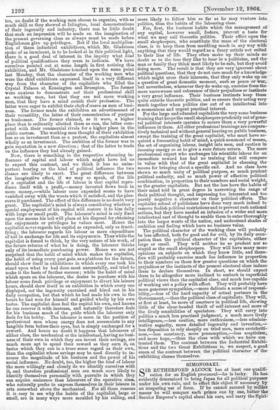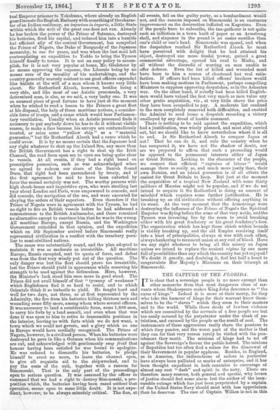tual Emperor prisoner to Yokohama, where already an English ()laud
invests the English Embassy with somethingof the charac- ter of an Indian residency, an impen'urn in imperio, a little State within which the writ of the great one does not run. Already he has broken the power of the Prince of Satsuma, destroyed his batteries, tired his capital, and reduced him into a humble but efficient ally of the central Government, has compelled the Prince of Negate, the Duke of Burgundy of the Japanese monarchy, to sue for peace, and was when the last mail left contemplating an expedition to Yeddo to bring the Tycoon himself finally to terms. It is not an easy policy to accom- plish, for it is not very popular at home, Mr. Gladstone by no means approving the expense, the Liberals being by no means sure of the morality of his undertakings, and the country generally scarcely content to see good officers expended like bullets at the will of a man whom it knows very little about. Sir Rutherford Alcock, however, besides being a very able, and like moat of our Asiatic proconsuls, a very determined man, is also, as we said, a very husky one. It was an unusual piece of good fortune to have just at the moment when he wished to read a lesson to the Princes a great fleet at his disposal, the help of three maritime nations, a consider- able force of troops, and a cause which would bear Parliamen- tary ventilation. Usually when an Asiatic proconsul finds it necessary to put anybody down he has to do it without visible reason, to make a fuss because his envoys are contumeliously treated, or seize some "yellow ship " as a " material guarantee," but Sir Rutherford Alcock had a cause which he could avow. It is by no means certain that the Japanese had any right whatever to shut up the Inland Sea, any more than the British Government has a right to shut up the Irish Channel, the road from open sea to open sea being quite clear to vessels. At all events, if they had a right based on prescriptive possession, such as was acknowledged when we agreed to redeem our share of the Danish Sound Dues, that right had been surrendered by treaty, and if the first agreement be said to have been extorted by force the second certainly was not. Tho worthy persons with high cheek-bones and inquisitive eyes, who were strolling last year about London and Paris, were empowered to concede, and did concede, the navigation of the sea, and were executed for obeying the orders of their superiors. Even therefore if the Prince of Negate were in agreement with the Tycoon, he had no right to fire on British vessels before he had addressed a remonstrance to the British Ambassador, and there remained no alternative except to convince him that he was in the wrong. All maritime Europe, except Russia, and the Washington Government coincided in that opinion, and the expedition which on 5th September arrived before Simonosaki really represented civilization in a conflict with the treachery pecu- liar to semi-civilized nations.
The cause was substantially sound, and the plan adopted to maintain it was as moderate as irresistible. All maritime Europe, Russia excepted, sent its quota of force, and defeat was from the first very wisely put out of the question. The only danger was lest the fleet should prove too irresistible, lest the Prince should yield in appearance while reserving his strength to be used against the defenceless. Here, however, the Minister's luck stood him once more in good stead. The Prince did not avail himself of that " tyranny of weakness " which Englishmen find it so hard to resist, and to which Orientals think it so imbecile to yield. He fought hard and well for two days, not three, as at first represented by the Admiralty, the fire from his batteries killing thirteen men and wounding some fifty more, ameng whom where several officers. It was necessary to land a considerable force, some 1,800 men, to carry his forts by a land assault, and even when that was done it was open to him to retire to inaccessible positions in the interior, leaving us with forts which we do not want, a town which we could not govern, and a glory which no one in Europe would have cordially recognized. The Prince of Negate, however, is a civilized person. When his batteries were destroyed he gave in like a German when his communications are cut, and acknowledged with gentlemanly sang froid that honour having been satisfied he was bound to apologize. He was ordered to dismantle his batteries, to pledge himself to erect no more, to leave the channel open, to give all requisite aid to the shipwrecked, and to pay the costs of the suit, together with a ransom for Simonosaki. That is the only part of. the proceedings open to serious question. It was assumed by the officer in command that we had a right to destroy Simonosaki, a pro- position which, the batteries having been razed without that operation, seems open to some little doubt. It is not expe- dient, however, to be always minutely critical. The fine, at
all events, fell on the guilty party, as a bombardment would not, and the ransom imposed on Simonosaki is an enormous improvement on the destruction inflicted on Kagosima. Even if the people have to subscribe, the tax-gatherer is not quite such an infliction in a town built of paper as an Armstrong shell, and sixpence in the pound is an easier sacrifice than one's child or one's head. Simonosaki was spared, and when the despatches reached Sir Rutherford Alcock he must, have perceived with delight that he had attained his object, destroyed one more feudal power, gained a great commercial advantage, opened his road to Miako, and all without the discredit of warring on men unable to offer defence. Even the list of killed and wounded must have been to him a source of chastened but real satis- faction. If officers had been killed officers' brothers would have been making motions in Parliament, perhaps compelling Ministers to suppress approving despatches, as in the Ashantee war. On the other hand, if nobody had been killed English- men would have valued the feat very much as men value any other gratis acquisition, viz , at very little above the price they have been compelled to pay. A. moderate list confined to the men completely removed both difficulties, and enabled the Admiral to send home a despatch recording a victory unalloyed by any dread of hostile comment.
There is nothing to be said against the expedition, which had a justification, was wisely planned, and most ably carried out, but we should like to know nevertheless where it is all to end. Is Sir Rutherford Alcock to conquer Japan or not? That he can do it, and rule the country when he has conquered it, we have not the shadow of doubt, nor are we prepared to affirm that such a proceeding would be opposed to the permanent interests either of Japan or Great Britain. Looking to the character of the people, we suspect that efficient " captains of labour " would manage them as easily as, and much more justly than, their own Damios, and an island possession is of all others the easiest for Great Britain to keep. But just at the moment the acquisition of a tropical New Zealand with some thirty millions of Maories might not be popular, and if we do not intend to acquire it Sir Rutherford is doing an amount of mischief which requires some further justification. He is breaking up an old civilization without offering anything in its stead. At the very moment that the Armstrongs were destroying the influence of the Prince of Nagato the Spiritual Emperor was flying before the arms of that very noble, and the Tycoon was inventing lies by the ream to avoid breaking either with his great feudatory or his great feudatory's foes. The organization which has kept these chiefs within bounds is visibly breaking up, and the old Empire resolving itself into a knot of principalities, always at war with each other, always hankering to recetnent union at any cost of blood. Have we any right whatever to bring all this misery on Japan unless we intend to replace the ancient regime by one more full of possibilities than any which the country has yet enjoyed ? We doubt it greatly, and doubting it, feel but half a heart to congratulate Her Majesty's Ministers on their triumph at Simonosaki.































 Previous page
Previous page